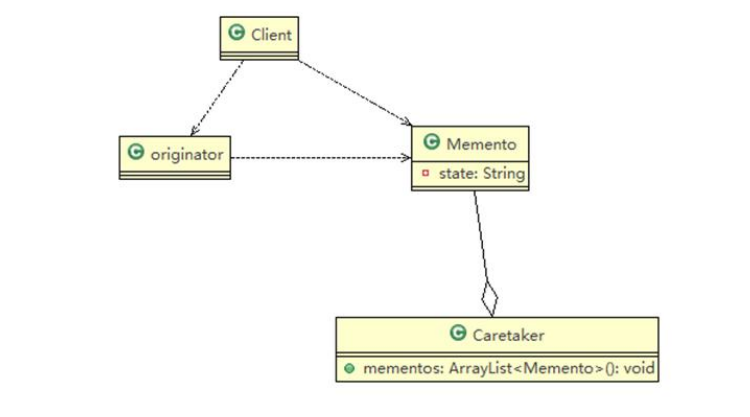java-备忘录模式
本文最后更新于:3 个月前
备忘录模式
基本介绍:
- 备忘录模式(Memento patten)在不破坏封装性的前提下,捕获一个对象的内部状态,并在该对象之外保存这个状态。这样以后就可以将该对象恢复到原先保存的状态。
- 现实生活中的备忘录是用来记录某些要去做的事情,或者是记录已经达成的共同意见的事情,以防忘记了。而在软件层面,备忘录模式有着相同的含义,备忘录主要用来记录一个对象的某种状态,或者某些数据,当要做回退时,可以从备忘录对象里获取原来的数据进行恢复操作。

代码实现:
1
2
3
4
5
6
7
8
9
10
11
12
13
14
|
public class Memento {
private String state;
public Memento(String state) {
super();
this.state = state;
}
public String getState() {
return state;
}
}
|
1
2
3
4
5
6
7
8
9
10
11
12
13
14
15
16
17
18
19
20
21
22
23
24
|
public class Originator {
private String state;
public String getState() {
return state;
}
public void setState(String state) {
this.state = state;
}
public Memento saveStateMemento() {
return new Memento(state);
}
public void getStateFromMemento(Memento memento) {
state = memento.getState();
}
}
|
1
2
3
4
5
6
7
8
9
10
11
12
13
14
15
|
public class Caretaker {
private List<Memento> mementoList = new ArrayList<>();
public void add(Memento memento) {
mementoList.add(memento);
}
public Memento get(int index) {
return mementoList.get(index);
}
}
|
1
2
3
4
5
6
7
8
9
10
11
12
13
14
15
16
17
18
19
20
21
22
23
24
25
26
|
public class Client {
public static void main(String[] args) {
Originator originator = new Originator();
Caretaker caretaker = new Caretaker();
originator.setState(" 状态#1 攻击力 100 ");
caretaker.add(originator.saveStateMemento());
originator.setState(" 状态#2 攻击力 80 ");
caretaker.add(originator.saveStateMemento());
originator.setState(" 状态#3 攻击力 50 ");
caretaker.add(originator.saveStateMemento());
System.out.println("当前的状态是 =" + originator.getState());
originator.getStateFromMemento(caretaker.get(0));
System.out.println("恢复到状态1 , 当前的状态是");
System.out.println("当前的状态是 =" + originator.getState());
}
}
|
游戏案例代码实现:
1
2
3
4
5
6
7
8
9
10
11
12
13
14
15
16
17
18
|
public class Caretaker {
private Memento memento;
public Memento getMemento() {
return memento;
}
public void setMemento(Memento memento) {
this.memento = memento;
}
}
|
1
2
3
4
5
6
7
8
9
10
11
12
13
14
15
16
17
18
19
20
21
22
23
24
25
26
27
28
29
30
31
32
33
34
35
36
37
| public class GameRole {
private int vit;
private int def;
public Memento createMemento() {
return new Memento(vit, def);
}
public void recoverGameRoleFromMemento(Memento memento) {
this.vit = memento.getVit();
this.def = memento.getDef();
}
public void display() {
System.out.println("游戏角色当前的攻击力:" + this.vit + " 防御力: " + this.def);
}
public int getVit() {
return vit;
}
public void setVit(int vit) {
this.vit = vit;
}
public int getDef() {
return def;
}
public void setDef(int def) {
this.def = def;
}
}
|
1
2
3
4
5
6
7
8
9
10
11
12
13
14
15
16
17
18
19
20
21
22
23
24
| public class Memento {
private int vit;
private int def;
public Memento(int vit, int def) {
super();
this.vit = vit;
this.def = def;
}
public int getVit() {
return vit;
}
public void setVit(int vit) {
this.vit = vit;
}
public int getDef() {
return def;
}
public void setDef(int def) {
this.def = def;
}
}
|
1
2
3
4
5
6
7
8
9
10
11
12
13
14
15
16
17
18
19
20
21
22
23
24
25
26
27
28
| public class Client {
public static void main(String[] args) {
GameRole gameRole = new GameRole();
gameRole.setVit(100);
gameRole.setDef(100);
System.out.println("和boss大战前的状态");
gameRole.display();
Caretaker caretaker = new Caretaker();
caretaker.setMemento(gameRole.createMemento());
System.out.println("和boss大战~~~");
gameRole.setDef(30);
gameRole.setVit(30);
gameRole.display();
System.out.println("大战后,使用备忘录对象恢复到站前");
gameRole.recoverGameRoleFromMemento(caretaker.getMemento());
System.out.println("恢复后的状态");
gameRole.display();
}
}
|
注意事项和细节
- 给用户提供了一种可以恢复状态的机制,可以使用户能够比较方便的回到某个历史的状态。
- 实现了信息的封装,使得用户不需要关心状态的保存细节。
- 如果类的成员变量过多,势必会占用比较大的资源,而且每一次保存都会消耗一定的内存、这个需要注意。
- 使用的应用场景
- 后悔药
- 游戏存档
- Windows里的ctrl+z
- 浏览器的回退
- 数据库的事务管理
- 为了节省内存,备忘录模式可以结合原型模式一起食用
本博客目前大部分文章都是参考尚硅谷或者马士兵教育的学习资料!
